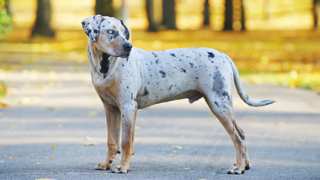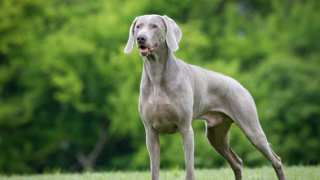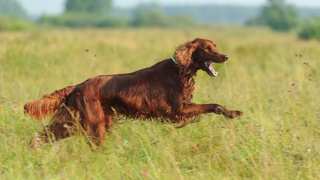Since this is an extremely active and athletic breed, the German Shorthaired Pointer diet needs to consist of foods that contain large amounts of animal proteins and carbohydrates--nutrients that provide these dogs with much-needed energy. German Shorthaired Pointer dog food should also have some omega fatty acids that keep their waterproof coats healthy. All this means that GSPs will thrive much better on a diet of premium dry food; these high-quality foods may be more expensive and difficult to obtain, but they have the vital proteins, carbs, and other nutrients that cheap generic foods, which contain mostly empty "filler" ingredients, simply don't.
One advantage of these premium foods is that your GSP won't need to eat as much of it to fulfill its daily dietary needs. On average, the typical adult GSP--and the amount may vary depending on the dog's age, size, and activity level--will need about 2½ cups of premium dry food per day, divided into two meals. GSP puppies will need a bit less: again depending on its age, a GSP pup will need about 1½ cups per day, divided into three meals (not two) until the age of six months. Owners should feed their young GSPs puppy food until they're about nine months old, then transition to adult food by mixing the two types over a period of several days. It's also recommended that owners establish a consistent feeding schedule for their GSPs so the dogs get used to eating at the same time every day. For more info, see this German Shorthaired Pointer puppy feeding guide:
German Shorthaired Pointer Feeding ChartDog AgeDog WeightFood TypeAmountFrequency2 Months10 lbsDry (Puppy Formula)0.3 cups3x/day3 Months17 lbsDry0.4 cups3x/day6 Months30 lbsDry0.5 cups3x/day9 Months40 lbsDry* (Puppy/Adult)1 cup2x/day12 Months50 lbsDry (Adult Formula)1.25 cups2x/day14 Months+55 lbsDry1.25 cups2x/day*--Around this time, transition your GSP from puppy to adult food by first mixing in a little adult food with the puppy food. Over the course of a week, in each meal add more adult food to the mix until the dog is eating adult food entirely.
It's best to try and stick to the above-listed portions; while the amounts may seem a bit small, they're ample enough for your GSP. Any dog that overeats can become obese--and while this breed doesn't have a high potential for weight gain, a fat German Shorthaired Pointer will have joint, breathing, and digestive issues, not to mention a shortened lifespan. You can control your GSP's weight in several ways: by having consistent feeding and exercise schedules; by not feeding the dog table scraps; and by not "free-feeding," which is leaving food in the GSP's bowl all the time so it can eat anytime it wants. It's highly recommended that you put the dog's bowl down only at mealtimes, then pick it up 15-20 minutes after the dog begins eating.
If you're worried your GSP is overweight, give the dog this simple Ribs Test: run a hand along its side, and if you can't feel any ribs, it's diet time. Reduce the dog's daily food consumption by one-fourth, and add an extra walk, jog, or play period to its daily exercise schedule.






